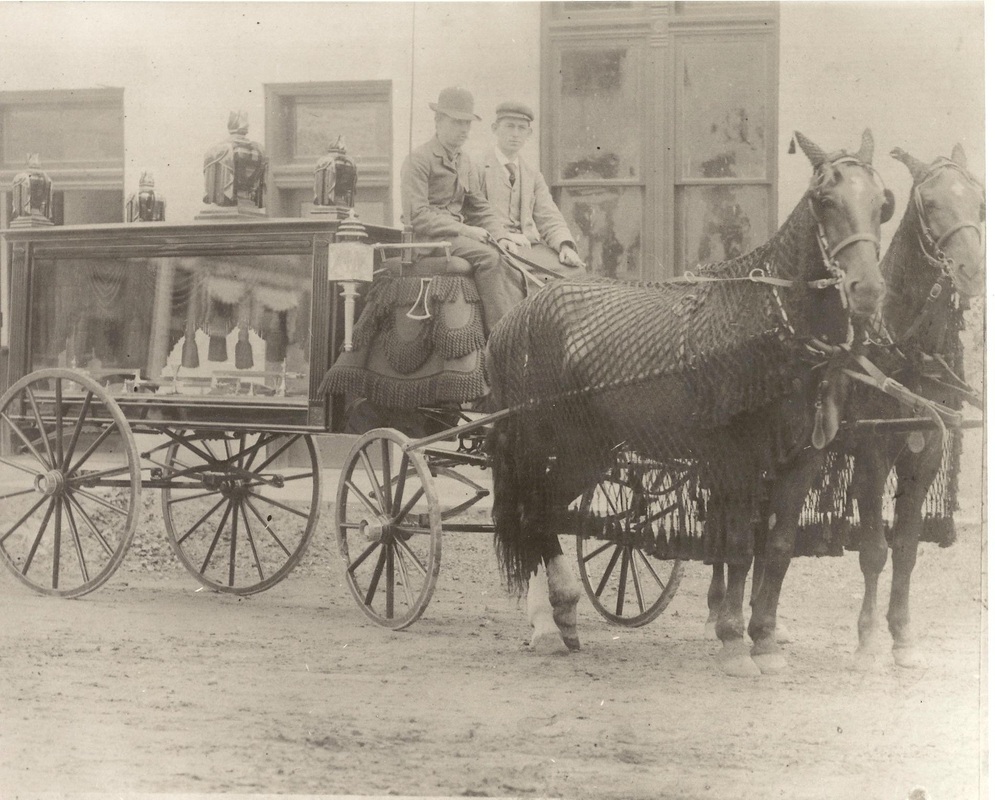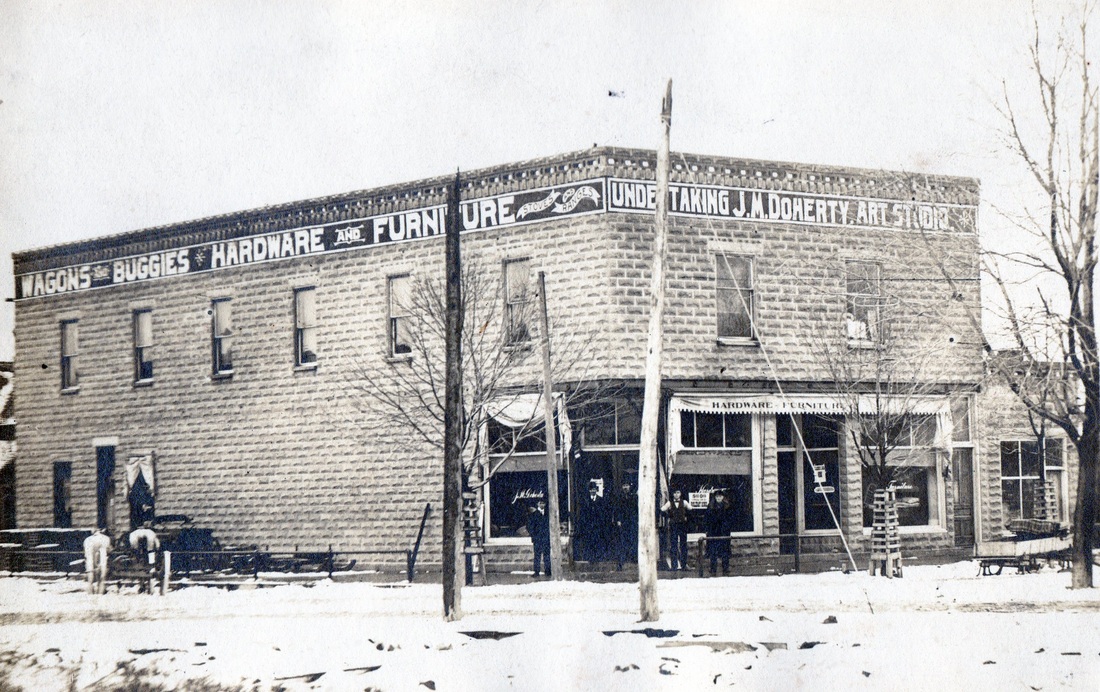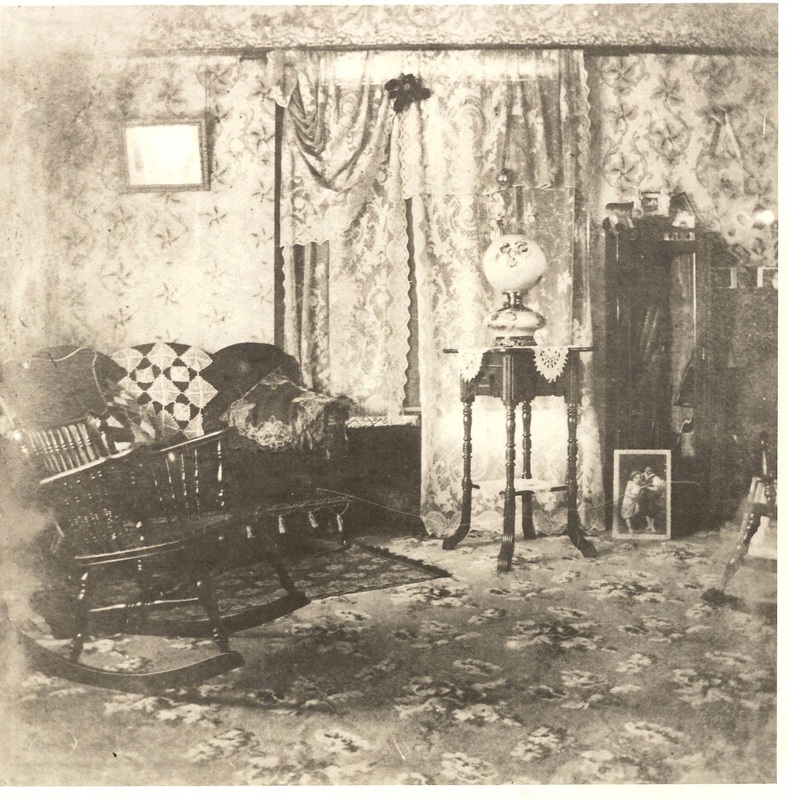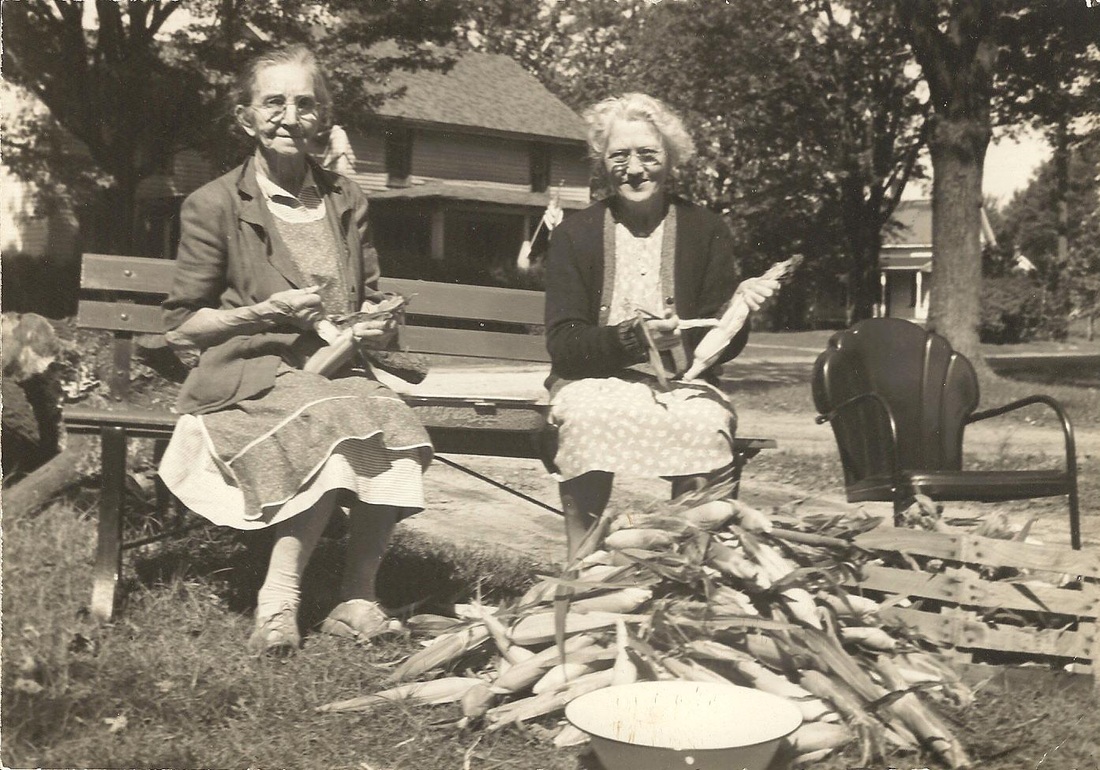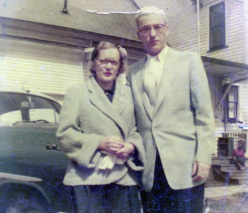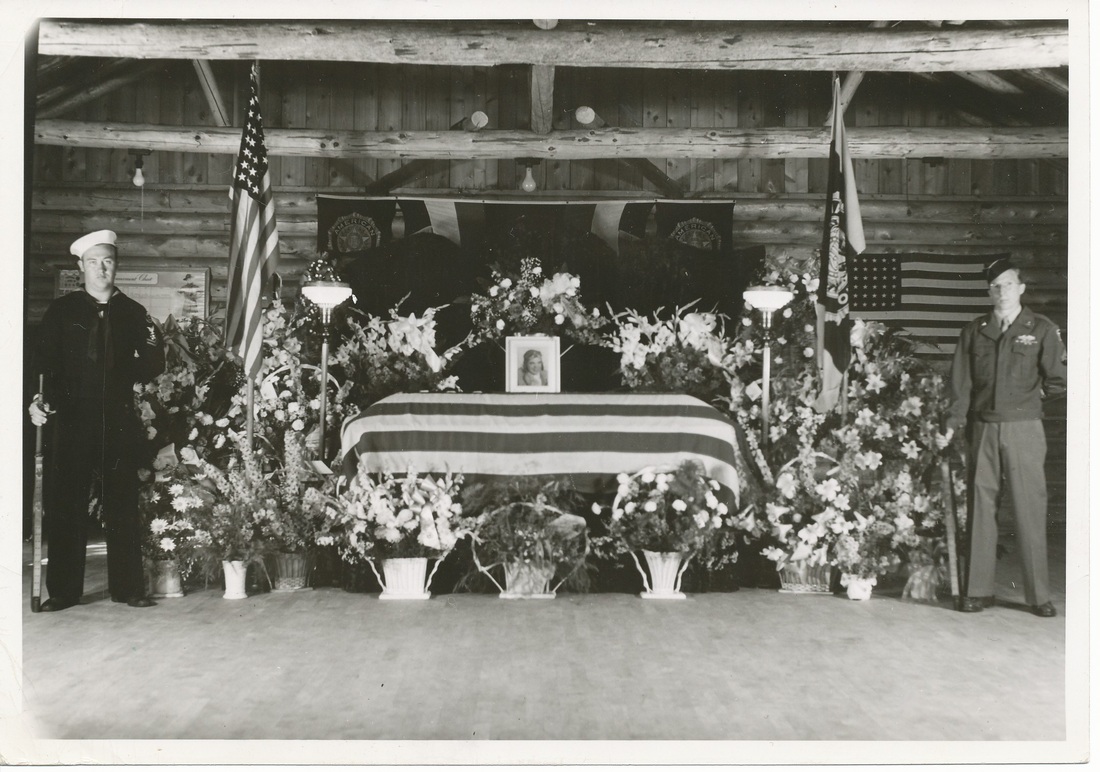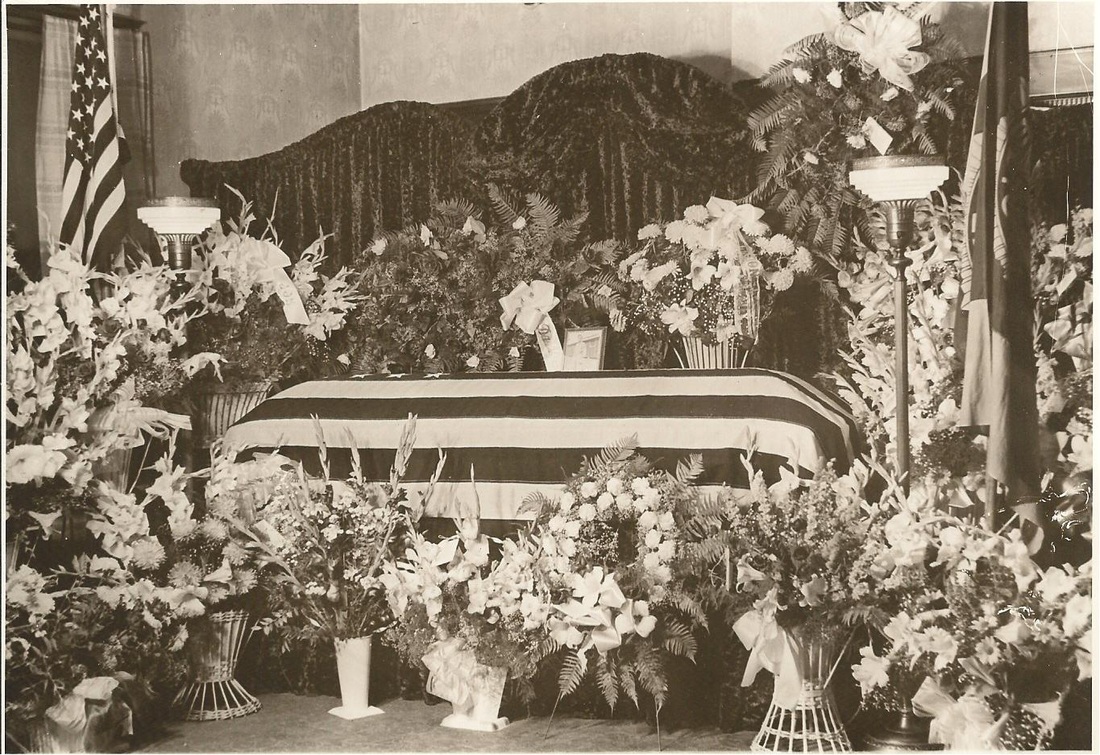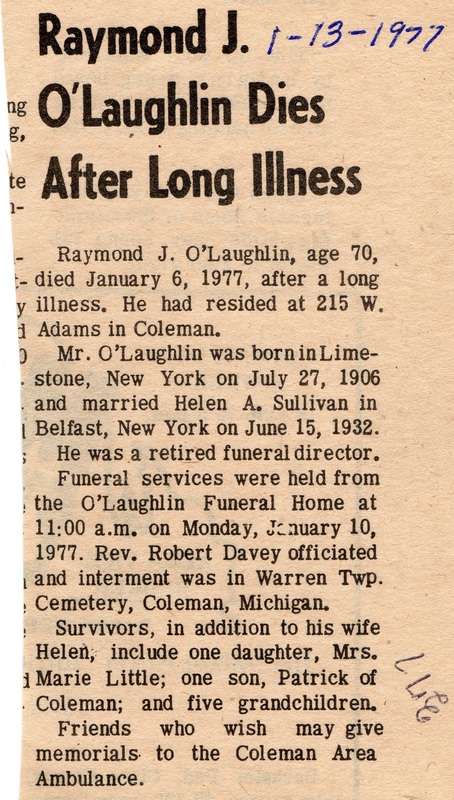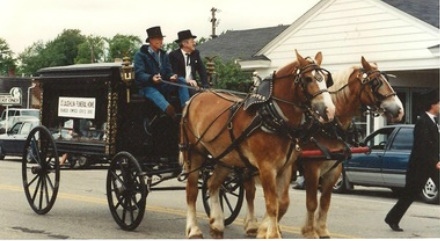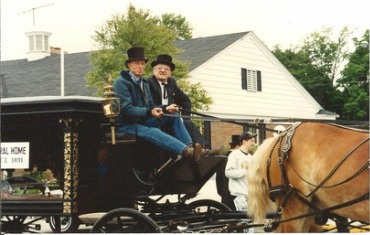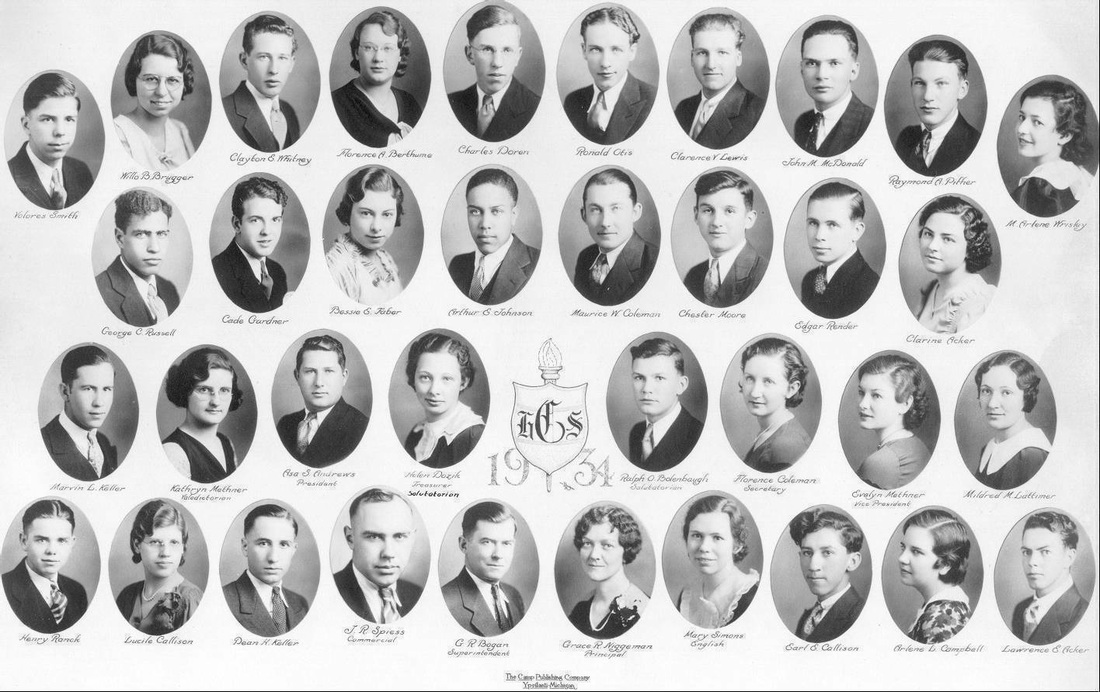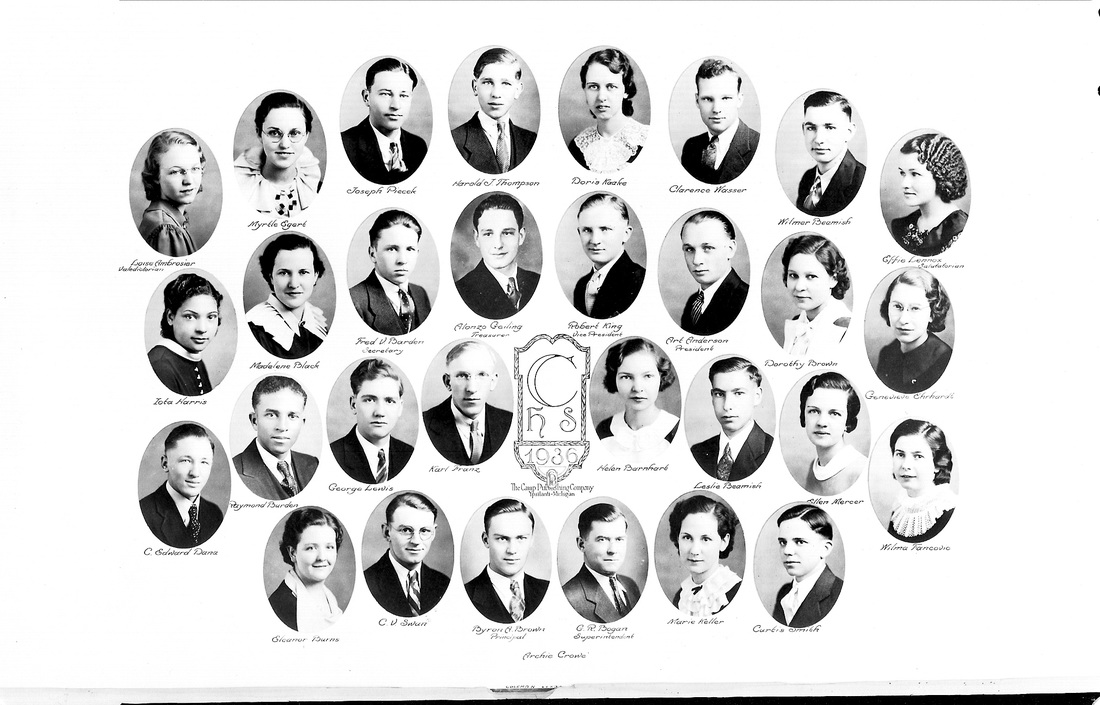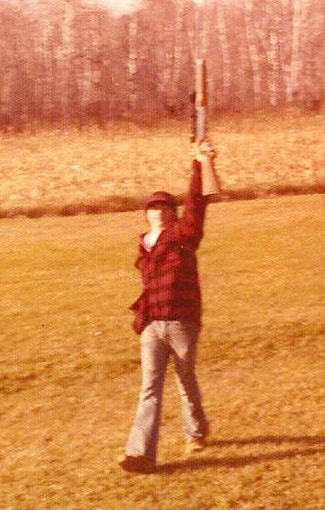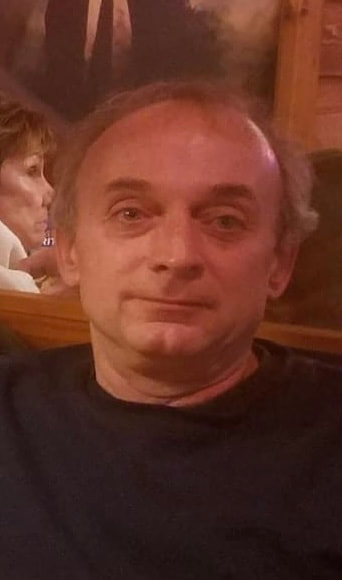|
|
How I Became Your Home Town Mortician.
Most of my life decisions and major events have been made or happened in the spring of the year. I do not know if this is because I, like most people after a long dark winter, find that the brighter and warmer days of spring wake us up and motivates us to be active. Or, it may be that with my birthday arriving on March 26, I evaluate my past year and begin to make plans and adjustments for the next year.
I made my decision about which college and occupation to pursue, in the spring of my senior year of high school. Of course, my high school and college graduation were in the spring. I proposed to my wife in the spring. My wife and both daughters were born in the spring.
There are events in my life that I remember with almost crystal clarity and picture perfect recall. One of those occurred near my 5th birthday, when I was upstairs in my parent’s bedroom playing with the contents of my favorite treasure chest. My dad had employed Wayne Burke to build him a birch gun cabinet. In the center of the base of the gun cabinet were two drawers. The contents of these two drawers were spilled out onto the floor in front of me. These were my dad’s talisman: his Marine Corp hats, medals and pins, discharge, company photo, a red and white plastic miniature bowling pin with dice inside, old hunting licenses, bullets, empty casings, money belt, U.S. Army Compass, and a few other prized possessions.
I had been quizzing my dad about the history and meaning of each of the pieces in front of me, when I asked him for the first time what he did downstairs. I knew that from time to time, we would have dead people downstairs and that no one else in town did. And that we would have crowds of people gathered throughout our house: in the kitchen and living room, for visitations and funerals, but what did my dad do?
He responded to my question, at first, with a pause. Then, with sincerity and humble pride, explained to me in simple terms that when a person in our small hometown died, a family member would call him and ask for his help. My dad would then go to where the person had died, pick them up, either at home or in the hospital. He would bring them to our home, give them a bath, shave the men, dress them up, and make them look nice so that the family could come in and see them to say goodbye. Their friends would come in too, and tell the family how much that person meant to them, how sorry they were, and that they too would miss the person that was lying in our home. I am sure that the idea and understanding of mortality was slowly creeping into my brain. I knew my dad was the only person in town who was there to help families when someone died. The comprehension began. With tears forming in my eyes, I asked my dad, “When you die, who will take care of you?”
I can imagine my poor dad thinking, “How can I answer this question? What can I say without adding to the hurt?”
I looked at my dad and promised him, “I will take care of you, Dad.”
My training into the profession of small hometown mortician began that spring. My dad’s least favorite job was arranging the flowers for visitation and funerals. So I started out helping him with the flowers. He must have had the patience of Job. Most of the time, this is when a mortician feels rushed. The flowers come, more often than not, at the last minute and you need to have them arranged in time for the family’s arrival. Imagine how much help a five-year-old would be under those circumstances. My next step of supporting my dad was with his second least favorite job, arranging chairs from visitation to funeral and back again. I actually drew a map of the placement of chairs in the “fireplace room”, “big room” and his “office”. After the funeral, he would go in procession to the cemetery and I would go out front and arrange the chairs back into position for visitation. Many times, he would come back to prepare the funeral home for a visitation that was to begin later that day. One day when I was “helping” arrange the front room, while he was in route to the cemetery, the front doorbell rang. I answered the door and there were two ladies who inquired if they could come inside and see the next person who would lie in state that evening. I said no, and that they would have to wait until my dad got back. He arrived just as they were leaving and asked me what the ladies wanted. I told him. My next lesson on becoming the small hometown mortician was to commence. My dad named the two ladies who had stopped by, the Arnold sisters. I was told that one was Arthell Haggarty, my soon to be Kindergarten Teacher and the other was her sister. I am sure that he continued to expound on their family relation (genealogy), employment and where they lived. I failed part of my lesson from that day. I can’t remember if Arthell’s sister, who accompanied her, was Kathryn(Jim) Sayers, Ruth (Walt) Bills, or Pauline(Clifford) Roman, but I did retain the genealogy.
My next lesson on being a small hometown mortician was far less positive. Let me remind you, before the days of cell phones, pagers etc., a funeral home phone must be phone sit. This meant that the phone had to be answered 24 hours a day, 7 days a week, 52 weeks a year. Therefore, if my family ever went anywhere together: shopping, bowling, dinner etc., four things had to happen. First, Pat must not be working at the funeral home, nor must he be on an ambulance run (the funeral home had the only ambulance in town) and he must not be on a fire department run. Then he would have to pay someone to come and stay at the funeral home and answer not only the funeral home phone, but we were also in charge of the emergency, fire and sometimes, the police phone. However, we were only in charge of the police phone when the Louis Fancovic family was fortunate enough to have a night out. You can see how a dinner night out was a greatly anticipated event. Anyhow, this lesson took place in the Coleman Restaurant, during a long awaited family dinner. As Pat’s family, which included his wife and four children ranging in age from five to eleven, made their way to their table, a fellow patron started in on my dad with the usual run of “dead jokes” and did not stop until we were almost finished with our dinner. I, as a five-year-old child, knew that my dad’s night out had been spoiled, along with that of his wife and family. This lesson continued almost daily throughout my school years. I really believe that is one of the reasons I would never admit to an interest in the “family business” to the general public. Sometimes, it would save me from having to hear the same, tired and old jokes. Also, being the youngest, I would have been the last in line to assume my dad’s business, which may never have come to be, if any of my siblings decided to become a mortician. My dad attempted to discourage us from entering the profession because, “You are always tied down. You have no freedom. You are under the public microscope. I have seen children who do not have the dedication, destroy their family’s business and disgrace the profession” and later, “It helped to destroy my marriage”.
We can fast forward to high school. My dad was not a man who believed in allowances for his children or paying for good grades on report cards. If we wanted spending money, then we were expected to earn it. So, in high school, I started to work for him by parking cars for funerals. By that time my brothers were on to college and working full time jobs, which left my dad shorthanded for help. When I turned sixteen, I was hired by him to make removals from funeral homes, hospitals and nursing homes. During which, I assisted in my first home removal of Howard Jones. He was the father-in-law of my eighth grade English teacher Carol(Gary) Jones, husband of my elementary school librarian Blanche Jones, and father of one of my dad’s friends, Gary(Carol) Jones. Small hometown indeed. I still denied being the “next in line” for my dad’s successor.
My senior year of high school had come and it was time to plan for my future. I tried to imagine myself experiencing a lifetime of working in a factory, or as a laborer, a manager for a corporation, a school teacher, and many other occupations. My thoughts kept coming back to the fact that I liked my small hometown. I believed that I would like to be my own boss not relying on someone else, or to be responsible to someone else. I enjoyed helping people and attempting to ease their sorrow and burden. I enjoyed the socializing and the challenge that no two days were alike. The most important aspect to me was the fact that I was so thankful that my dad was always home. If I were fortunate enough to be able to take over the family business or to purchase a different small hometown funeral home, I would be able to be home for my family. So, the biggest deterrent of always being tied down with the business was also the most attractive facet to me. When spring arrived, I had the extreme discomfort of telling my dad that, against his wishes and years of attempting to talk me out of it, I was going to college to complete the schooling for a license in Mortuary Science. He took the announcement rather well. I asked if I could serve my required apprenticeship under his direction, while I attended Central Michigan University for my 2 years of pre-professional courses. He responded that if I still felt that way when summer rolled around, I could apply with the State for my apprenticeship. That is how things progressed. I started my apprenticeship with the O’Laughlin Funeral Home while attending CMU and working at McDonald’s Restaurant in Clare. I was promoted from being the valet, to removal personnel, door man, embalmer (my first solo embalming was Horace ‘Bob’ McDonald, who was my “squale” squirrel hunting companion and steel guitar instructor), cosmetician, positioner, funeral counselor, and after graduation, funeral director. Upon graduation, I applied for employment with several funeral homes. I heard all of the popular hollow promises; “Someday son, this will all be yours. No, you don’t have to work weekends, only if we are busy. Of course, if you work for lower wages, I will discount the selling price in the future.” My dad requested a meeting with me, the recent college graduate/job applicant and started to devise a way to bring me back to the small hometown where I belonged. He worked out an agreement with another local funeral director, that if they pooled their resources, they could both afford to hire me and I would work with the two of them. That was the situation for two years, and then my dad’s health started to fail. My wife and I moved back into the small hometown funeral home that had been recently vacated by my father’s marriage and him moving out. I started running the business for my dad to lessen his burden. I eventually purchased the funeral home from him in the spring of 1993, before the birth of my second daughter. Five years later, I fulfilled the promise made to my Dad.
I became your home town mortician.
Most of my life decisions and major events have been made or happened in the spring of the year. I do not know if this is because I, like most people after a long dark winter, find that the brighter and warmer days of spring wake us up and motivates us to be active. Or, it may be that with my birthday arriving on March 26, I evaluate my past year and begin to make plans and adjustments for the next year.
I made my decision about which college and occupation to pursue, in the spring of my senior year of high school. Of course, my high school and college graduation were in the spring. I proposed to my wife in the spring. My wife and both daughters were born in the spring.
There are events in my life that I remember with almost crystal clarity and picture perfect recall. One of those occurred near my 5th birthday, when I was upstairs in my parent’s bedroom playing with the contents of my favorite treasure chest. My dad had employed Wayne Burke to build him a birch gun cabinet. In the center of the base of the gun cabinet were two drawers. The contents of these two drawers were spilled out onto the floor in front of me. These were my dad’s talisman: his Marine Corp hats, medals and pins, discharge, company photo, a red and white plastic miniature bowling pin with dice inside, old hunting licenses, bullets, empty casings, money belt, U.S. Army Compass, and a few other prized possessions.
I had been quizzing my dad about the history and meaning of each of the pieces in front of me, when I asked him for the first time what he did downstairs. I knew that from time to time, we would have dead people downstairs and that no one else in town did. And that we would have crowds of people gathered throughout our house: in the kitchen and living room, for visitations and funerals, but what did my dad do?
He responded to my question, at first, with a pause. Then, with sincerity and humble pride, explained to me in simple terms that when a person in our small hometown died, a family member would call him and ask for his help. My dad would then go to where the person had died, pick them up, either at home or in the hospital. He would bring them to our home, give them a bath, shave the men, dress them up, and make them look nice so that the family could come in and see them to say goodbye. Their friends would come in too, and tell the family how much that person meant to them, how sorry they were, and that they too would miss the person that was lying in our home. I am sure that the idea and understanding of mortality was slowly creeping into my brain. I knew my dad was the only person in town who was there to help families when someone died. The comprehension began. With tears forming in my eyes, I asked my dad, “When you die, who will take care of you?”
I can imagine my poor dad thinking, “How can I answer this question? What can I say without adding to the hurt?”
I looked at my dad and promised him, “I will take care of you, Dad.”
My training into the profession of small hometown mortician began that spring. My dad’s least favorite job was arranging the flowers for visitation and funerals. So I started out helping him with the flowers. He must have had the patience of Job. Most of the time, this is when a mortician feels rushed. The flowers come, more often than not, at the last minute and you need to have them arranged in time for the family’s arrival. Imagine how much help a five-year-old would be under those circumstances. My next step of supporting my dad was with his second least favorite job, arranging chairs from visitation to funeral and back again. I actually drew a map of the placement of chairs in the “fireplace room”, “big room” and his “office”. After the funeral, he would go in procession to the cemetery and I would go out front and arrange the chairs back into position for visitation. Many times, he would come back to prepare the funeral home for a visitation that was to begin later that day. One day when I was “helping” arrange the front room, while he was in route to the cemetery, the front doorbell rang. I answered the door and there were two ladies who inquired if they could come inside and see the next person who would lie in state that evening. I said no, and that they would have to wait until my dad got back. He arrived just as they were leaving and asked me what the ladies wanted. I told him. My next lesson on becoming the small hometown mortician was to commence. My dad named the two ladies who had stopped by, the Arnold sisters. I was told that one was Arthell Haggarty, my soon to be Kindergarten Teacher and the other was her sister. I am sure that he continued to expound on their family relation (genealogy), employment and where they lived. I failed part of my lesson from that day. I can’t remember if Arthell’s sister, who accompanied her, was Kathryn(Jim) Sayers, Ruth (Walt) Bills, or Pauline(Clifford) Roman, but I did retain the genealogy.
My next lesson on being a small hometown mortician was far less positive. Let me remind you, before the days of cell phones, pagers etc., a funeral home phone must be phone sit. This meant that the phone had to be answered 24 hours a day, 7 days a week, 52 weeks a year. Therefore, if my family ever went anywhere together: shopping, bowling, dinner etc., four things had to happen. First, Pat must not be working at the funeral home, nor must he be on an ambulance run (the funeral home had the only ambulance in town) and he must not be on a fire department run. Then he would have to pay someone to come and stay at the funeral home and answer not only the funeral home phone, but we were also in charge of the emergency, fire and sometimes, the police phone. However, we were only in charge of the police phone when the Louis Fancovic family was fortunate enough to have a night out. You can see how a dinner night out was a greatly anticipated event. Anyhow, this lesson took place in the Coleman Restaurant, during a long awaited family dinner. As Pat’s family, which included his wife and four children ranging in age from five to eleven, made their way to their table, a fellow patron started in on my dad with the usual run of “dead jokes” and did not stop until we were almost finished with our dinner. I, as a five-year-old child, knew that my dad’s night out had been spoiled, along with that of his wife and family. This lesson continued almost daily throughout my school years. I really believe that is one of the reasons I would never admit to an interest in the “family business” to the general public. Sometimes, it would save me from having to hear the same, tired and old jokes. Also, being the youngest, I would have been the last in line to assume my dad’s business, which may never have come to be, if any of my siblings decided to become a mortician. My dad attempted to discourage us from entering the profession because, “You are always tied down. You have no freedom. You are under the public microscope. I have seen children who do not have the dedication, destroy their family’s business and disgrace the profession” and later, “It helped to destroy my marriage”.
We can fast forward to high school. My dad was not a man who believed in allowances for his children or paying for good grades on report cards. If we wanted spending money, then we were expected to earn it. So, in high school, I started to work for him by parking cars for funerals. By that time my brothers were on to college and working full time jobs, which left my dad shorthanded for help. When I turned sixteen, I was hired by him to make removals from funeral homes, hospitals and nursing homes. During which, I assisted in my first home removal of Howard Jones. He was the father-in-law of my eighth grade English teacher Carol(Gary) Jones, husband of my elementary school librarian Blanche Jones, and father of one of my dad’s friends, Gary(Carol) Jones. Small hometown indeed. I still denied being the “next in line” for my dad’s successor.
My senior year of high school had come and it was time to plan for my future. I tried to imagine myself experiencing a lifetime of working in a factory, or as a laborer, a manager for a corporation, a school teacher, and many other occupations. My thoughts kept coming back to the fact that I liked my small hometown. I believed that I would like to be my own boss not relying on someone else, or to be responsible to someone else. I enjoyed helping people and attempting to ease their sorrow and burden. I enjoyed the socializing and the challenge that no two days were alike. The most important aspect to me was the fact that I was so thankful that my dad was always home. If I were fortunate enough to be able to take over the family business or to purchase a different small hometown funeral home, I would be able to be home for my family. So, the biggest deterrent of always being tied down with the business was also the most attractive facet to me. When spring arrived, I had the extreme discomfort of telling my dad that, against his wishes and years of attempting to talk me out of it, I was going to college to complete the schooling for a license in Mortuary Science. He took the announcement rather well. I asked if I could serve my required apprenticeship under his direction, while I attended Central Michigan University for my 2 years of pre-professional courses. He responded that if I still felt that way when summer rolled around, I could apply with the State for my apprenticeship. That is how things progressed. I started my apprenticeship with the O’Laughlin Funeral Home while attending CMU and working at McDonald’s Restaurant in Clare. I was promoted from being the valet, to removal personnel, door man, embalmer (my first solo embalming was Horace ‘Bob’ McDonald, who was my “squale” squirrel hunting companion and steel guitar instructor), cosmetician, positioner, funeral counselor, and after graduation, funeral director. Upon graduation, I applied for employment with several funeral homes. I heard all of the popular hollow promises; “Someday son, this will all be yours. No, you don’t have to work weekends, only if we are busy. Of course, if you work for lower wages, I will discount the selling price in the future.” My dad requested a meeting with me, the recent college graduate/job applicant and started to devise a way to bring me back to the small hometown where I belonged. He worked out an agreement with another local funeral director, that if they pooled their resources, they could both afford to hire me and I would work with the two of them. That was the situation for two years, and then my dad’s health started to fail. My wife and I moved back into the small hometown funeral home that had been recently vacated by my father’s marriage and him moving out. I started running the business for my dad to lessen his burden. I eventually purchased the funeral home from him in the spring of 1993, before the birth of my second daughter. Five years later, I fulfilled the promise made to my Dad.
I became your home town mortician.
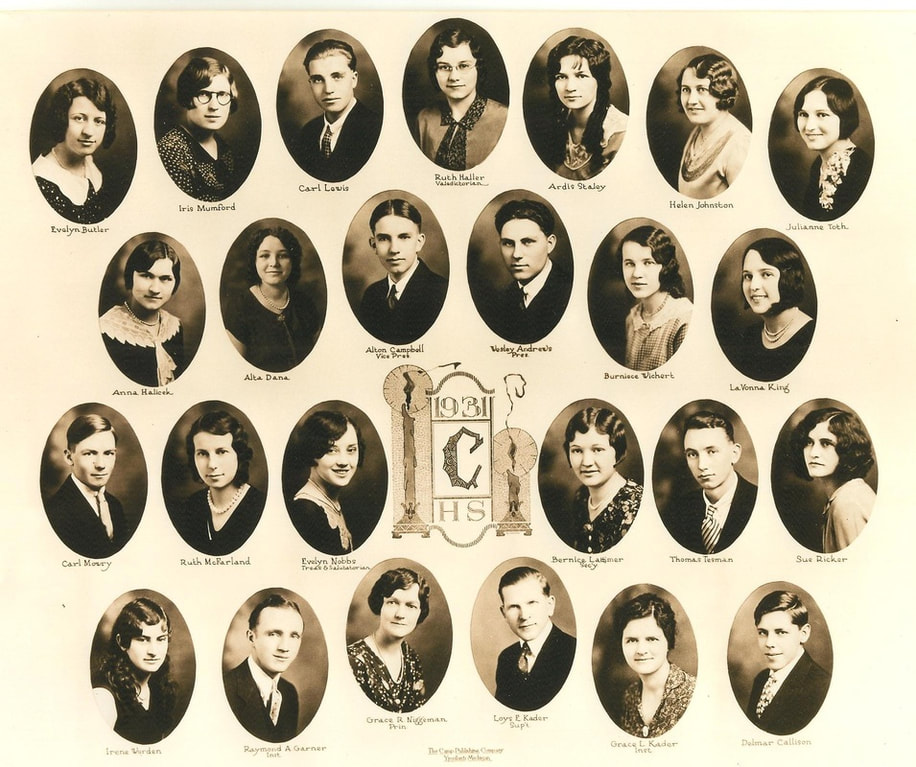
Dec. 7, 2018
It’s 4 am and I find myself behind the steering wheel in the pre-dawn dark, driving to Mt. Pleasant. An impish grin, the companion to my mind as it travels back through a lifetime of moments. To those who do not know me, it would be perceived as an inappropriate response to my mission.
Kathleen Marie Lewis, at age 14 was approached by Raymond J. O’Laughlin, manager of the Doherty Funeral Home in Coleman who inquired if she would be willing to gain employment under his direction, as an organist at the funeral home. She agreed. 74 years later, she retired from that position. Kathleen Lewis Long proudly held the title of being the employee with the longest tenure at the O’Laughlin Funeral Home, Inc..
Kathleen has been a part of my memories of growing up in the funeral home, accompanying my dad on errands to the Gambles and IGA and later when I was her employer and running my own errands at the lumberyard. The attractive strawberry blonde lady who always had a smile for the toe headed curly haired blond boy. She gave that boy a positive female role model: displaying great character, compassion, professionalism and sense of humor. She must have had great endurance and patience to survive three generations of O’Laughlin Morticians.
I found her to be an amazing woman. Like all of us, Kathleen has had to survive extremely difficult times, especially this past year. She was always able to keep her impish smile and sense of humor through it all. No topic of conversation was off limits and she openly accepted some odd inquiries and dialog from her latest mortuary employer. Kathleen was a lady who presented me with a positive female role model during my impressionable years and was a joy to work with. She provided me an important friendship that offered a balance offsetting the stress and grief of my chosen profession. I cannot think back to a negative encounter between myself and Kathleen. They all resulted in a positive resolution. More often than not, bringing an impish grin to my face.
I must stop now. I have reached my destination. Kathleen Marie Long died this morning. If you decide to pay your respects to this outstanding example of womanhood and her family, please be patient and understanding with the man behind the curtain. Although his is standing at attention with an impish grin, look closely, you will notice a mist in his eyes.
Kathleen, you are missed already.
Growing up, my parents always told me there was never a baby kissed more than me. They said my brother Paul could not walk by me without giving me a kiss as a sign of his affection. As I got older, I always replied, “He replaced his lips with his knuckles.” He could not pass by me without a punch. Ah, the life of a little brother.
There were many advantages of growing up as a little brother in the large expanse of the funeral home. The visitation room served as the wild west with our western towns, fort Apache, cowboys, Indians and outlaws, miles and miles of hot wheel tracks, GI Joe missions, Major Matt Mason space exploration, nerf basketball (Full Court), nerf baseball and long before karaoke, a lip sync concert. Since the funeral home was the first home in the neighborhood to have air conditioning, massive sleepovers on the floor of the chapel during the hot summer nights was a common occurrence.
There were times Paul reveled in the position of “The Big Brother”. He taught me how to shave, spent days one summer teaching me the proper technique for shooting free throws, (my junior year I shot 100%, 1 for 1 😉) , delivering me my first hangover, and giving me Paul’s proven pointers in the art of lovemaking. Approximately twenty years later, I was given the privilege of passing on one of these life lessons. Paul and his oldest son PJ were out on our basketball court and Paul was instructing his oldest on the finer points of free throw form. Paul and I were trading knowing smiles as PJ was getting frustrated. He finally told his dad, “You don’t know anything!” So, Uncle Mike stepped up to the plate and started lessons. After PJ made a few baskets, he looked at his Dad and told him, “Uncle Mike knows what he is doing!” Paul and I held back the smiles as I told PJ, “Your Dad taught me everything I know about shooting free throws.”
As Paul entered his teenage years, he found his first passion. Whitetail deer hunting. He would spend every daylight hour in his blind waiting for his chance to fill his tag with the biggest buck in the section. He started out at 14 years of age bagging the largest buck ever on the O’Laughlin Farm. That only increased his desire to be a “wall hanger” hunter. It developed into a borderline obsession. Through the years, he harvested some very impressive bucks. Unfortunately, that led to him having quite a dominating view on the deer herd. He arrived one afternoon after work and was on his way into the cabin to don his hunting gear and noticed his little brother sitting on the tailgate of his truck, smoking a cigar (I did not normally smoke), drinking a beer with a big grin on his face. Paul curiously sauntered over and peeked over the side of the truck to see my biggest buck to date. His response was, “you killed my buck!” after which he went back to his truck, left camp and never returned that season to hunt. Five years later, Pam had tagged out on her first 8-point buck. We were all sitting around the opening day dinner table waiting for Pam to tell her buck story. We were curious about how Paul would respond. Everyone started throwing comments out to Pam, who was just starting to show her pregnancy. “How could you drag that big buck with that belly in your way? How could you ever get down low enough to dress that buck out? How did you ever get back up after that?” Pam just sat back grinning, “I did not have to do a thing. Paul dragged, dressed and brought the buck up to the cabin!” We all looked at Paul in shocked disbelief. “I did not want her to have any chance to hurt the baby or for them to catch Lyme disease.”, Paul sheepishly replied. His true colors of concern showed through the competitive spirit he possessed.
Being the last two children home as the family deteriorated through divorce brought us closer together and gave us some interesting experiences, especially in the backdrop of the funeral home. One night as we were watching tv, the front doorbell rang, it was a family coming into the funeral home for their family viewing. Their family member was not out in the chapel. We scurried into the fireplace room where Pat was suffering from the flu. He told us he got too sick to put their family member in the casket and move the casket out front and turn the heat and lights on. Paul and I unceremoniously left the family standing outside on the front porch, hurried back to the prep room, placed the individual in the casket, moved him out front, and turned the lights on. We left the folding doors closed so they didn’t see convalescing Pat on the couch and proceeded to tend door until the visitation concluded.
Later in life, Paul and I convinced Pat that he needed a vacation and if he was to go during spring break, between Paul and I we could cover the funeral home, with no school in session and different practice schedules. We could not believe he went, leaving his two teenage sons to run his funeral home. He really must have needed that vacation.
Growing up in the one-man funeral home, all of us brothers had to take our turn assisting Pat with removals, funerals and visitations. It developed a very strong belief in us that if we assisted the community with their family members, we also had a sense of duty to do the same with our family members and therefore, it is our strong family tradition to take care of our own.
On October 29th 1998, Patrick Raymond O’Laughlin died at Covenant Health Care in Saginaw. The nurse informed us that it would take a couple hours for them to process Pat, at which point they would then be notifying the funeral home we select and then the funeral home could come to the hospital and retrieve Pat. I let the nurse know that she had just notified the funeral home selected, by talking to me. I had arrived that morning, before Pat had died, with the strong belief that I would be taking him home that day. I knew that I could expedite things and bring the cot to his room and save them the trouble of transporting him to the morgue or I could go to the morgue and await their timely arrival. With understanding, the nurse assured me that Pat would be downstairs, reunited with me in no more than 20 minutes. Paul told me, “I’m coming with you.” Twenty minutes later, my brother Paul and I took our dad home.
On August 8th 2022, Paul Joseph O’Laughlin died at MyMichigan Medical Center in Midland. My brother Raymond and I brought our brother Paul home.
Growing up, my parents always told me there was never a baby kissed more than me. They said my brother Paul could not walk by me without giving me a kiss as a sign of his affection. As I got older, I always replied, “He replaced his lips with his knuckles.” He could not pass by me without a punch. Ah, the life of a little brother.
There were many advantages of growing up as a little brother in the large expanse of the funeral home. The visitation room served as the wild west with our western towns, fort Apache, cowboys, Indians and outlaws, miles and miles of hot wheel tracks, GI Joe missions, Major Matt Mason space exploration, nerf basketball (Full Court), nerf baseball and long before karaoke, a lip sync concert. Since the funeral home was the first home in the neighborhood to have air conditioning, massive sleepovers on the floor of the chapel during the hot summer nights was a common occurrence.
There were times Paul reveled in the position of “The Big Brother”. He taught me how to shave, spent days one summer teaching me the proper technique for shooting free throws, (my junior year I shot 100%, 1 for 1 😉) , delivering me my first hangover, and giving me Paul’s proven pointers in the art of lovemaking. Approximately twenty years later, I was given the privilege of passing on one of these life lessons. Paul and his oldest son PJ were out on our basketball court and Paul was instructing his oldest on the finer points of free throw form. Paul and I were trading knowing smiles as PJ was getting frustrated. He finally told his dad, “You don’t know anything!” So, Uncle Mike stepped up to the plate and started lessons. After PJ made a few baskets, he looked at his Dad and told him, “Uncle Mike knows what he is doing!” Paul and I held back the smiles as I told PJ, “Your Dad taught me everything I know about shooting free throws.”
As Paul entered his teenage years, he found his first passion. Whitetail deer hunting. He would spend every daylight hour in his blind waiting for his chance to fill his tag with the biggest buck in the section. He started out at 14 years of age bagging the largest buck ever on the O’Laughlin Farm. That only increased his desire to be a “wall hanger” hunter. It developed into a borderline obsession. Through the years, he harvested some very impressive bucks. Unfortunately, that led to him having quite a dominating view on the deer herd. He arrived one afternoon after work and was on his way into the cabin to don his hunting gear and noticed his little brother sitting on the tailgate of his truck, smoking a cigar (I did not normally smoke), drinking a beer with a big grin on his face. Paul curiously sauntered over and peeked over the side of the truck to see my biggest buck to date. His response was, “you killed my buck!” after which he went back to his truck, left camp and never returned that season to hunt. Five years later, Pam had tagged out on her first 8-point buck. We were all sitting around the opening day dinner table waiting for Pam to tell her buck story. We were curious about how Paul would respond. Everyone started throwing comments out to Pam, who was just starting to show her pregnancy. “How could you drag that big buck with that belly in your way? How could you ever get down low enough to dress that buck out? How did you ever get back up after that?” Pam just sat back grinning, “I did not have to do a thing. Paul dragged, dressed and brought the buck up to the cabin!” We all looked at Paul in shocked disbelief. “I did not want her to have any chance to hurt the baby or for them to catch Lyme disease.”, Paul sheepishly replied. His true colors of concern showed through the competitive spirit he possessed.
Being the last two children home as the family deteriorated through divorce brought us closer together and gave us some interesting experiences, especially in the backdrop of the funeral home. One night as we were watching tv, the front doorbell rang, it was a family coming into the funeral home for their family viewing. Their family member was not out in the chapel. We scurried into the fireplace room where Pat was suffering from the flu. He told us he got too sick to put their family member in the casket and move the casket out front and turn the heat and lights on. Paul and I unceremoniously left the family standing outside on the front porch, hurried back to the prep room, placed the individual in the casket, moved him out front, and turned the lights on. We left the folding doors closed so they didn’t see convalescing Pat on the couch and proceeded to tend door until the visitation concluded.
Later in life, Paul and I convinced Pat that he needed a vacation and if he was to go during spring break, between Paul and I we could cover the funeral home, with no school in session and different practice schedules. We could not believe he went, leaving his two teenage sons to run his funeral home. He really must have needed that vacation.
Growing up in the one-man funeral home, all of us brothers had to take our turn assisting Pat with removals, funerals and visitations. It developed a very strong belief in us that if we assisted the community with their family members, we also had a sense of duty to do the same with our family members and therefore, it is our strong family tradition to take care of our own.
On October 29th 1998, Patrick Raymond O’Laughlin died at Covenant Health Care in Saginaw. The nurse informed us that it would take a couple hours for them to process Pat, at which point they would then be notifying the funeral home we select and then the funeral home could come to the hospital and retrieve Pat. I let the nurse know that she had just notified the funeral home selected, by talking to me. I had arrived that morning, before Pat had died, with the strong belief that I would be taking him home that day. I knew that I could expedite things and bring the cot to his room and save them the trouble of transporting him to the morgue or I could go to the morgue and await their timely arrival. With understanding, the nurse assured me that Pat would be downstairs, reunited with me in no more than 20 minutes. Paul told me, “I’m coming with you.” Twenty minutes later, my brother Paul and I took our dad home.
On August 8th 2022, Paul Joseph O’Laughlin died at MyMichigan Medical Center in Midland. My brother Raymond and I brought our brother Paul home.
Paul J. O’Laughlin, 61, of Gladwin died unexpectedly Monday August 8, 2022. He was born in Midland September 11, 1960. Paul was employed at Robinson Industries Inc. of Coleman. He was avid outdoorsman. He enjoyed hunting, fishing, swimming and walking the dog. Paul also enjoyed gaming.
He is survived by his children: Paul O’Laughlin of Saginaw, Justin O’Laughlin of Gladwin, Riley O’Laughlin of Gladwin, Ryan O’Laughlin & Fiancée Taylor Everhart of Gladwin, grandchildren Taylen and Skyler O’Laughlin, brothers Ray & Melissa O’Laughlin of Grand Rapids, Mike & Pam O’Laughlin of Coleman, several nieces and nephews. Paul was preceded in death by his father Patrick.
Funeral services will be held 11:00 am Friday August 12, 2022 at the O’Laughlin Funeral Home, Inc. with Rev. Scott Hayes officiating. Burial will take place in the Warren Township Cemetery, Coleman. Friends may call at the funeral home on Thursday from 2-4 & 6-8pm and on Friday starting at 10 am until the time of services.
He is survived by his children: Paul O’Laughlin of Saginaw, Justin O’Laughlin of Gladwin, Riley O’Laughlin of Gladwin, Ryan O’Laughlin & Fiancée Taylor Everhart of Gladwin, grandchildren Taylen and Skyler O’Laughlin, brothers Ray & Melissa O’Laughlin of Grand Rapids, Mike & Pam O’Laughlin of Coleman, several nieces and nephews. Paul was preceded in death by his father Patrick.
Funeral services will be held 11:00 am Friday August 12, 2022 at the O’Laughlin Funeral Home, Inc. with Rev. Scott Hayes officiating. Burial will take place in the Warren Township Cemetery, Coleman. Friends may call at the funeral home on Thursday from 2-4 & 6-8pm and on Friday starting at 10 am until the time of services.

It was time.
He had owned his business for 31 years, having purchased it from his father. He had only been on vacation twice in twenty years. The last time having been one year prior. During that second vacation, he and his wife left Michigan driving to Florida for a two-week reprieve. The trip extended into a three-month sabbatical. After leaving Florida, they drove across the country to San Diego, California, where he had been stationed during his time in the Marine Corps. Then leisurely cris-crossing the nation on their return back to Coleman. No concern about schedules, telephones, business or the sleep deprived nights due to work. His first taste of peace and tranquility in decades.
The last few years he had witnessed the decline in attendance at his deer camp card crew. The deaths of his friends, “Bud” Bremer, Dick Forsberg and Dean Thering.
His health had started to slowly decline, starting the Monday after his marriage in 1988. Woke up in the hospital on oxygen. Diagnosed with Alpha -1- antitrypsin deficiency emphysema, inherited from his father. He had since been hospitalized again.
It was time.
The buyer he had in mind had been working for him since high school. He grew up in the area. Graduated second in his class from Wayne State University. Had been licensed for 8 years and had run the business successfully both times that he had been hospitalized. All the boxes checked.
They had discussed the probability of the sale, just not a time frame. He knew that the purchaser wanted to include the hunting property in the sale. He could not find fault with that, as he fully understood the need for a respite; the emotional and physical strain and time commitment of owning and running this type of business, the obligation to be on call 24 hours a day, 7 days a week, 52 weeks a year. A small enough business that you cannot afford to hire full time help to cover for extended vacations and pay off the mortgage too. The need for a local decompression zone was imperative. That was the reason why, years ago, he himself had purchased the property just minutes from town.
……………………..
It was time.
He had been working here ever since he was fourteen. He served his apprenticeship here while attending college. He moved back after graduating college, working with two additional funeral homes, so they could all afford to hire him.
The owner’s health was failing. He had been hospitalized twice in the last 6 years. His employee never demanded that he needed to work. Still, the owner would show up every day to spend some time visiting and spreading goodwill with the clientele. The last time he attempted to assist in a professional capacity was Feb. 1991, when Dean Thering had died. Whether it was the physical strain of the task or the emotional stress of his good friend dying, he had to give up after only 15 minutes. He found himself tiring quickly. If there was no work pressing, he would nap for a few hours before ending the day and driving back home. The employee wanted the owner to live long enough to receive full compensation for his lifetime of dedication to the community.
It was time.
He had owned his business for 31 years, having purchased it from his father. He had only been on vacation twice in twenty years. The last time having been one year prior. During that second vacation, he and his wife left Michigan driving to Florida for a two-week reprieve. The trip extended into a three-month sabbatical. After leaving Florida, they drove across the country to San Diego, California, where he had been stationed during his time in the Marine Corps. Then leisurely cris-crossing the nation on their return back to Coleman. No concern about schedules, telephones, business or the sleep deprived nights due to work. His first taste of peace and tranquility in decades.
The last few years he had witnessed the decline in attendance at his deer camp card crew. The deaths of his friends, “Bud” Bremer, Dick Forsberg and Dean Thering.
His health had started to slowly decline, starting the Monday after his marriage in 1988. Woke up in the hospital on oxygen. Diagnosed with Alpha -1- antitrypsin deficiency emphysema, inherited from his father. He had since been hospitalized again.
It was time.
The buyer he had in mind had been working for him since high school. He grew up in the area. Graduated second in his class from Wayne State University. Had been licensed for 8 years and had run the business successfully both times that he had been hospitalized. All the boxes checked.
They had discussed the probability of the sale, just not a time frame. He knew that the purchaser wanted to include the hunting property in the sale. He could not find fault with that, as he fully understood the need for a respite; the emotional and physical strain and time commitment of owning and running this type of business, the obligation to be on call 24 hours a day, 7 days a week, 52 weeks a year. A small enough business that you cannot afford to hire full time help to cover for extended vacations and pay off the mortgage too. The need for a local decompression zone was imperative. That was the reason why, years ago, he himself had purchased the property just minutes from town.
……………………..
It was time.
He had been working here ever since he was fourteen. He served his apprenticeship here while attending college. He moved back after graduating college, working with two additional funeral homes, so they could all afford to hire him.
The owner’s health was failing. He had been hospitalized twice in the last 6 years. His employee never demanded that he needed to work. Still, the owner would show up every day to spend some time visiting and spreading goodwill with the clientele. The last time he attempted to assist in a professional capacity was Feb. 1991, when Dean Thering had died. Whether it was the physical strain of the task or the emotional stress of his good friend dying, he had to give up after only 15 minutes. He found himself tiring quickly. If there was no work pressing, he would nap for a few hours before ending the day and driving back home. The employee wanted the owner to live long enough to receive full compensation for his lifetime of dedication to the community.
It was time.

Mary’s Mike
March 19, 1988, I became Pat’s Mike.
When my dad married Mary Trombley Lincoln, things became a little complicated. Our family now contained 2 Marys, 2 Mikes and 2 Pauls. For the sake of identification, I became Pat’s Mike and my new step-brother became Mary’s Mike.
The first time I met Mary’s family was an Easter Dinner at her Mom, Ida’s home. As Pam and I walked up the driveway, our attention was drawn to a young boy and his sister laughing and running through the yard; Tim and his sister Amy Lincoln, Mike’s children. It was the idyllic family holiday, which I had not experienced since the break-up of my family several years before. Great food, lively conversation and plenty of activity from a group of children.
Mike and I started our brotherly relationship the summer that Pam and I got married, in 1985. Pam and I had bought our starter home in Midland. Mike, with great patience and biting humor allowed me to assist him with roofing, painting and installing windows in our new home. This was the start of my builder’s apprenticeship with Mike; continuing with a couple of weeks or months each year pouring concrete, moving buildings, roofing, remodeling, building garages, showroom, deer blinds, culminating when we spent a year building Pam and my house and then moving it 15 years later.
After the first few years of introducing him as my step-brother Mike, I just dropped the “step" and would introduce him as my brother Mike.
When people would ask, my response would be “We were named correctly, the Pauls are alike and so are the Mikes.” Mike and I both enjoyed being in the outdoors; hunting, fishing and just spending time in nature. I believe we were both convinced we each had a great sense of humor and a strong work ethic. That’s not to say that we did not know how to enjoy ourselves.
While roofing the Funeral Home with cousin Dan Lincoln, we got snowed off and decided to spend the day up at Lincoln Land (the family cabin up by Dodge City) returning way past curfew. Or the time Ron Alward, Mike and I decided to fish steel head on the Manistee River, leaving at 4 am and returning almost 24 hours later. My wife, who had a lot of patience then, had to stand in for me professionally on both of those occasions.
Of course, my favorite “Lincoln” farm memory is when Mike took his brother-in-law, Gregg Cookenmaster out to the farm to show off his finished product. My dog Ashley was there by herself, as I had to run to the Funeral Home. I arrived a couple hours after they did and found them still in the cabin. Mike was looking a tad bit nervous and his companion about the same. Ashley was guarding the door and wouldn’t let them leave. She would let anyone in the cabin, but leaving was another story. I think the thing that upset Mike the most was that there was no beer in the fridge.
Mike knew of my passion for mountain hunting and invited me to accompany him out to Bondurant, Wyoming to hunt with his dad, Tom Lincoln, and Paul Crittenden of Sleeping Indian Outfitters. This trip proved to strengthen my outdoor attraction, which eventually led to taking Pam, as well as both of my daughters back out to Wyoming over the course of 8 years; meeting Mike out there several more times.
For a few years, it was an annual tradition for Mike to come out to the O’Laughlin Farm on New Year’s Eve to assist in thinning out the deer herd. It was a small compensation for all the work he had done at the farm. Including, but not limited to roofing the cabin during another snowstorm, giving my brother Paul something to complain about during said snowstorm when our hammers were interrupting his naptime, building the pole barn with Keith Cozat, installing windows, hanging doors, rebuilding floor joists, and building deer blinds. All the while being handicapped with his apprentice, who constantly complained about the country music that was always on the radio. Mike always had words of wisdom to motivate the wannabe carpenter. When on the roof, “Get your ass behind you”. When performing demolition, “If that doesn’t work, get mad”. When waiting for me to perform a task, “Dime holding up a dollar”.
I would not have had the fulfilling life both professionally and personally without experiencing the Mike Lincoln effect. Mike, along with the afore mentioned apprentice tore out walls of the funeral home, remodeled the larger visitation rooms, resided the outside, roofed, replaced windows, restrooms, built ramps and decks, built the selection room downtown, built the garage, sealed and painted the parking lots. Rebuilt the farm; from replacing floor joists, flooring, windows, roofing twice, building deer blinds, pole barn and rebuilding our home after moving it out to Herrick Road. Remodeling my daughter Rachel and Christopher’s starter home in Coleman. The days, weeks, months and years working together; talking, joking and learning. The hunting and fishing trips taken both locally and out of state.
Mike and I were working on my house after we had moved it out to Herrick Road, when his mother, Grandma Mary’s, health started to fail. Some day’s work would be delayed so that we could discuss the issues of Mary’s care and plans for her future. Mary was a wonderful wife to my dad, stepmom to me, mother-in-law to Pam, grandmother to my kids and had raised a caring and compassionate son in Mike.
We would often have early morning conversations around the campfire at Lincoln Land after everyone else had went to bed, hours in the cab of our pickups, after work hours sitting around the table at the farm, Mike and Jill’s kitchen table or the fire pit, not to mention phone calls discussing the current political situations. The last few years, I attempted to get Mike back out to the farm for the New Year’s Eve deer hunt. His energy and interest had slowed down, so we would settle with a phone call and conversation about the success or failures of the past deer season. Conversations all probably quite normal for brothers.
The addition of a brother that had many of the same interests that I enjoyed along his family: wife Jill, son Tim, and daughter Amy, expanded my family ties and built a lifetime of relationships, great memories, experiences and stories that I shall never forget. Mike’s extended family (Trombley, Lincoln and Cookenmaster) accepted Pam, the girls and I, inviting us to family holidays, celebrations, events and visits. We would arrive and be immediately included in the current conversation and activities. Another of my Lincoln moments occurred at Amy’s open house when the three dogs (Mary’s Mike, Ron Alward, and Pat’s Mike) serenaded Grandma Mary with “Momma Told Me Not To Come”.
I will miss Mary’s Mike, my brother.
March 19, 1988, I became Pat’s Mike.
When my dad married Mary Trombley Lincoln, things became a little complicated. Our family now contained 2 Marys, 2 Mikes and 2 Pauls. For the sake of identification, I became Pat’s Mike and my new step-brother became Mary’s Mike.
The first time I met Mary’s family was an Easter Dinner at her Mom, Ida’s home. As Pam and I walked up the driveway, our attention was drawn to a young boy and his sister laughing and running through the yard; Tim and his sister Amy Lincoln, Mike’s children. It was the idyllic family holiday, which I had not experienced since the break-up of my family several years before. Great food, lively conversation and plenty of activity from a group of children.
Mike and I started our brotherly relationship the summer that Pam and I got married, in 1985. Pam and I had bought our starter home in Midland. Mike, with great patience and biting humor allowed me to assist him with roofing, painting and installing windows in our new home. This was the start of my builder’s apprenticeship with Mike; continuing with a couple of weeks or months each year pouring concrete, moving buildings, roofing, remodeling, building garages, showroom, deer blinds, culminating when we spent a year building Pam and my house and then moving it 15 years later.
After the first few years of introducing him as my step-brother Mike, I just dropped the “step" and would introduce him as my brother Mike.
When people would ask, my response would be “We were named correctly, the Pauls are alike and so are the Mikes.” Mike and I both enjoyed being in the outdoors; hunting, fishing and just spending time in nature. I believe we were both convinced we each had a great sense of humor and a strong work ethic. That’s not to say that we did not know how to enjoy ourselves.
While roofing the Funeral Home with cousin Dan Lincoln, we got snowed off and decided to spend the day up at Lincoln Land (the family cabin up by Dodge City) returning way past curfew. Or the time Ron Alward, Mike and I decided to fish steel head on the Manistee River, leaving at 4 am and returning almost 24 hours later. My wife, who had a lot of patience then, had to stand in for me professionally on both of those occasions.
Of course, my favorite “Lincoln” farm memory is when Mike took his brother-in-law, Gregg Cookenmaster out to the farm to show off his finished product. My dog Ashley was there by herself, as I had to run to the Funeral Home. I arrived a couple hours after they did and found them still in the cabin. Mike was looking a tad bit nervous and his companion about the same. Ashley was guarding the door and wouldn’t let them leave. She would let anyone in the cabin, but leaving was another story. I think the thing that upset Mike the most was that there was no beer in the fridge.
Mike knew of my passion for mountain hunting and invited me to accompany him out to Bondurant, Wyoming to hunt with his dad, Tom Lincoln, and Paul Crittenden of Sleeping Indian Outfitters. This trip proved to strengthen my outdoor attraction, which eventually led to taking Pam, as well as both of my daughters back out to Wyoming over the course of 8 years; meeting Mike out there several more times.
For a few years, it was an annual tradition for Mike to come out to the O’Laughlin Farm on New Year’s Eve to assist in thinning out the deer herd. It was a small compensation for all the work he had done at the farm. Including, but not limited to roofing the cabin during another snowstorm, giving my brother Paul something to complain about during said snowstorm when our hammers were interrupting his naptime, building the pole barn with Keith Cozat, installing windows, hanging doors, rebuilding floor joists, and building deer blinds. All the while being handicapped with his apprentice, who constantly complained about the country music that was always on the radio. Mike always had words of wisdom to motivate the wannabe carpenter. When on the roof, “Get your ass behind you”. When performing demolition, “If that doesn’t work, get mad”. When waiting for me to perform a task, “Dime holding up a dollar”.
I would not have had the fulfilling life both professionally and personally without experiencing the Mike Lincoln effect. Mike, along with the afore mentioned apprentice tore out walls of the funeral home, remodeled the larger visitation rooms, resided the outside, roofed, replaced windows, restrooms, built ramps and decks, built the selection room downtown, built the garage, sealed and painted the parking lots. Rebuilt the farm; from replacing floor joists, flooring, windows, roofing twice, building deer blinds, pole barn and rebuilding our home after moving it out to Herrick Road. Remodeling my daughter Rachel and Christopher’s starter home in Coleman. The days, weeks, months and years working together; talking, joking and learning. The hunting and fishing trips taken both locally and out of state.
Mike and I were working on my house after we had moved it out to Herrick Road, when his mother, Grandma Mary’s, health started to fail. Some day’s work would be delayed so that we could discuss the issues of Mary’s care and plans for her future. Mary was a wonderful wife to my dad, stepmom to me, mother-in-law to Pam, grandmother to my kids and had raised a caring and compassionate son in Mike.
We would often have early morning conversations around the campfire at Lincoln Land after everyone else had went to bed, hours in the cab of our pickups, after work hours sitting around the table at the farm, Mike and Jill’s kitchen table or the fire pit, not to mention phone calls discussing the current political situations. The last few years, I attempted to get Mike back out to the farm for the New Year’s Eve deer hunt. His energy and interest had slowed down, so we would settle with a phone call and conversation about the success or failures of the past deer season. Conversations all probably quite normal for brothers.
The addition of a brother that had many of the same interests that I enjoyed along his family: wife Jill, son Tim, and daughter Amy, expanded my family ties and built a lifetime of relationships, great memories, experiences and stories that I shall never forget. Mike’s extended family (Trombley, Lincoln and Cookenmaster) accepted Pam, the girls and I, inviting us to family holidays, celebrations, events and visits. We would arrive and be immediately included in the current conversation and activities. Another of my Lincoln moments occurred at Amy’s open house when the three dogs (Mary’s Mike, Ron Alward, and Pat’s Mike) serenaded Grandma Mary with “Momma Told Me Not To Come”.
I will miss Mary’s Mike, my brother.
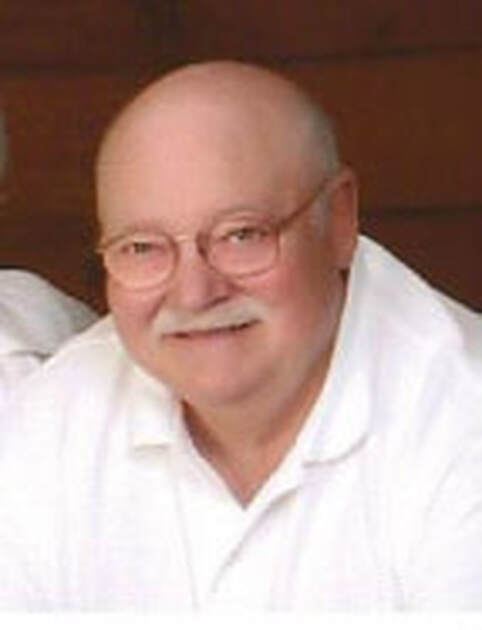
Eugene "John" Owens: Assistant
John was born in Isabella County. He worked with his Dad on the farm and assisted him with the transporting of cattle for other farmers. He graduated from Coleman High School where he played baseball. John retired from Dow Chemical in 1986 after 31 years of service. He also owned Owen's Miracle Water water softener sales and service for 26 years, traveling throughout the state. John started working with Patrick O'Laughlin at the funeral home in the 1970's. His vast experiences; growing up in Isabella County, hauling cattle, coaching baseball and softball, working at Dow Corning, running his softener business and working with Pat O'Laughlin with both the funeral home and ambulance, have made him a valuable asset. His knowledge of local families and the intricacies of the funeral home helps to ease the burden of the families we serve. John's duties include; answering the phone, first calls, assisting with arrangements, calling hours, services, all the non-licensed needs at the funeral home. John is married to Patricia (Cutler). They have four children; Lou Ann Ranck, Jolene Owens, Kim and Scott Owens.
John was born in Isabella County. He worked with his Dad on the farm and assisted him with the transporting of cattle for other farmers. He graduated from Coleman High School where he played baseball. John retired from Dow Chemical in 1986 after 31 years of service. He also owned Owen's Miracle Water water softener sales and service for 26 years, traveling throughout the state. John started working with Patrick O'Laughlin at the funeral home in the 1970's. His vast experiences; growing up in Isabella County, hauling cattle, coaching baseball and softball, working at Dow Corning, running his softener business and working with Pat O'Laughlin with both the funeral home and ambulance, have made him a valuable asset. His knowledge of local families and the intricacies of the funeral home helps to ease the burden of the families we serve. John's duties include; answering the phone, first calls, assisting with arrangements, calling hours, services, all the non-licensed needs at the funeral home. John is married to Patricia (Cutler). They have four children; Lou Ann Ranck, Jolene Owens, Kim and Scott Owens.
